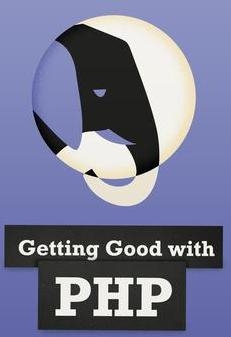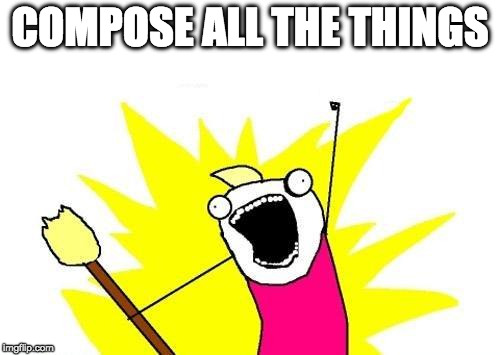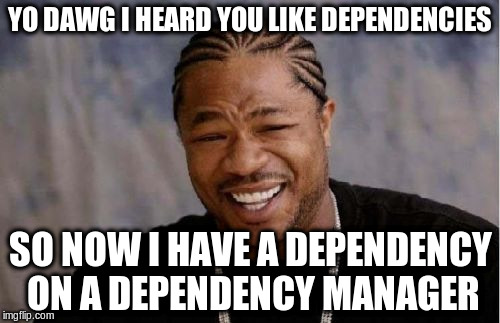Better dependency management: leverage composer to the limit
Can I use composer to do this?
A talk by Rodrigo Aguilera / @marinero
Norok!

Focused on processes, workflows and shared tools
Agenda
- The PHP reinassance
- The old days of drush make and the Drupal island
- Composer is awesome
- Your drupal project has dependencies too
- Compose all the things!
The PHP reinassance

We had too much code
Took less time to write (or copypaste) a solution yourself than to find a component you can reuse.
Reusability
Sharing must be easy or it won't happen.
Free software as a feature.
First attemps, aka: the way there
- Pear (PHP 4, required root, lots of includes)
- Class autoloading (PHP 5.0)
- Github (As replacement of Sourceforge)
- Namespaces (PHP 5.3)
- PHP standards (PSR-x) from PHP-FIG
The drupal island

Drush make (2010)

The shopping list
api = 2
core = 7.*
projects[views] = 3.1
projects[ctools] = 1.0-rc1
projects[media] = 2.x-dev
projects[nodequeue][subdir] = contrib
projects[nodequeue][version] = 2.0-alpha1
projects[nodequeue][patch][] = "http://drupal.org/files/issues/1023606-qid-to-name-6.patch"
projects[nodequeue][patch][] = "http://drupal.org/files/issues/nodequeue_d7_autocomplete-872444-6.patch"
libraries[jquery.cycle][download][type] = get
libraries[jquery.cycle][download][url] = http://malsup.com/jquery/cycle/release/jquery.cycle.zip?v2.99
libraries[jquery.cycle][destination] = libraries
Problems
- Downloads all the code everytime
- All dependencies listed
- You have to be specific about the versions
- Only remote patches
- Different make files for different purposes
Some brave sailors


Drupal makes some friends out there
Just by looking at the composer.json in drupal core
- A lot of symfony components(dependency injection, events, routing, yaml, etc)
- Twig
- Guzzle
- Composer
- And much more
Introducing Composer - 2012


The main goals
- Reuse third party libraries.
- Avoid dependency hell.
- Standarization among PHP projects
Definition
Composer is a tool for dependency management in PHP. It allows you to declare the dependent libraries your project needs and it will install them in your project for you.
What it means
- No more Copy/Paste of libraries
- Resolves dependencies
- Each project defines its own requirements
- Performs build tasks
- Autoloading: all code under the same roof
Similar to composer in diferent programming languages
- npm (javascript)
- pip (python)
- rubygems (with bundler)
Get Composer
# Quick-n-easy:
$ curl -sS https://getcomposer.org/installer | php
# Global
$ curl -sS https://getcomposer.org/installer | php -- --install-dir=bin
Structure of composer.json
Base manifest file for your project
{
"name": "rodrigoaguilera/mydrupalsite",
"description": "This site is awesome.",
"require": {
"drupal/honeypot": "1.*"
},
"require-dev": {
"drupal/devel": "1.*"
},
"config": {},
"extra": {}
}
Composer.json and composer.lock
-
The lock file has the dependencies already solved.
- The key to get everyone same versions is the lock file.
- Always commit your lock file.
Basic Commands
Install
composer install
Reads composer.lock and downloads all your dependencies in the /vendor directory.
Update
composer update [<vendor>/<package>]
Writes a new composer.lock based on what is on composer.json and downloads only what is missing.
You can update only one package to do more atomic updates.
Require
composer require <vendor>/<package>:"<version-constrain>"
Origin of libraries, modules, tools, etc.
The concept of repositories.
Packagist.org
Main repository for packages.
There is also https://packages.drupal.org/8 as a mirror of the modules and themes on drupal.org
Execute binaries
vendor/bin/drush
composer exec drush
Global vs local
-
The power of composer comes from having per project dependencies.
-
But you can also install composer plugins or tools shared by all the projects in your machine.
-
Use "composer global" before commands. (needs environment variable
$COMPOSER_HOMEto be set)
Simulating environments
"config": {
"platform": {
"php": "5.6.2",
"ext-mongodb": "1.1"
}
}
Semantic versioning

Composer in production
composer install --prefer-dist --no-dev --optimize-autoloader
- No git repository files
- The
require-devsection is ignored - Faster autoloader
Component vs. project
The composer.json for a project (the root package) has more capabalities like:
- Use your own repos
- Define hook scripts (post-install, pre-update, etc.)
- Configuration
Patches
{
"require": {
"cweagans/composer-patches": "~1.0",
"drupal/drupal": "8.5.*@dev"
},
"config": {
"preferred-install": "source"
},
"extra": {
"patches": {
"drupal/drupal": {
"Add startup configuration for PHP server": "https://www.drupal.org/files/issues/add_a_startup-1543858-30.patch"
}
}
}
}

Quiz: install or update
-
Be sure you have the last updates from your team:
composer install -
Deploying a new release of your application to production.
composer install -
Checked out with git a new project and want to start coding.
composer install -
Fetch new versions for the dependencies of your project.
composer update
But... How do I use composer in my drupal project?
Composer template for drupal projects comes to the rescue.
https://github.com/drupal-composer/drupal-project
What does the template do?
- Drupal will be downloaded with correct permissions ready for install.
- Declaring a new depencency and downloading is one semantic command.
- Modules, themes, and profiles (packages of type
drupal-[module|theme|profile]) will be placed inweb/[module|theme|profile]/contrib/
What does the template do?
- Creates default writable version of
settings.php. - Latest version of drush is installed locally for use at
vendor/bin/drush. - Latest version of DrupalConsole is installed locally for use at
vendor/bin/drupal.
Profit :D
- Now everyone can have not only the same modules but also drush and console
- Updating all your modules to the stable versions is just a couple of words away
- Your continous integration system can become much more simple

Frontend libraries are also dependencies
- Not in packagist (npmjs.org or bower)
- Different locations than modules
asset-packagist.org
- Add one repository to your root composer.json
- Collects both packages from npm and bower under 2 vendors
- Enables the ability to do
composer require npm-asset/bootstrap-sass:"^3" - Needs
oomphinc/composer-installers-extenderto define custom paths
Binary tools are also dependencies
- Generally found in distribution's repositories (apt-get, yum, etc)
- Usually compiled for a certain arquitecture and operating system
- Specific packages for each binary
- Available on vendor/bin/
- Examples: mouf/nodejs-installer, jakoch/phantomjs-installer

Recommendations
Minimum stability for all the dependencies or one by one
For example:
"minimum-stability": "dev"
You can be more semantic and declare it for each package like
composer require "drupal/webform":"^5@beta",
Config options
"config": {
"sort-packages": true,
"discard-changes": true,
"process-timeout": 600,
"platform": {
"php": "7.1.0"
}
}
Vendoring
Committing dependencies in the repo

The future
- Better user experience
- Best practices
- Make parts of Drupal reusable for other PHP projects
Questions
THE END
Multumesc.
- https://getcomposer.org/